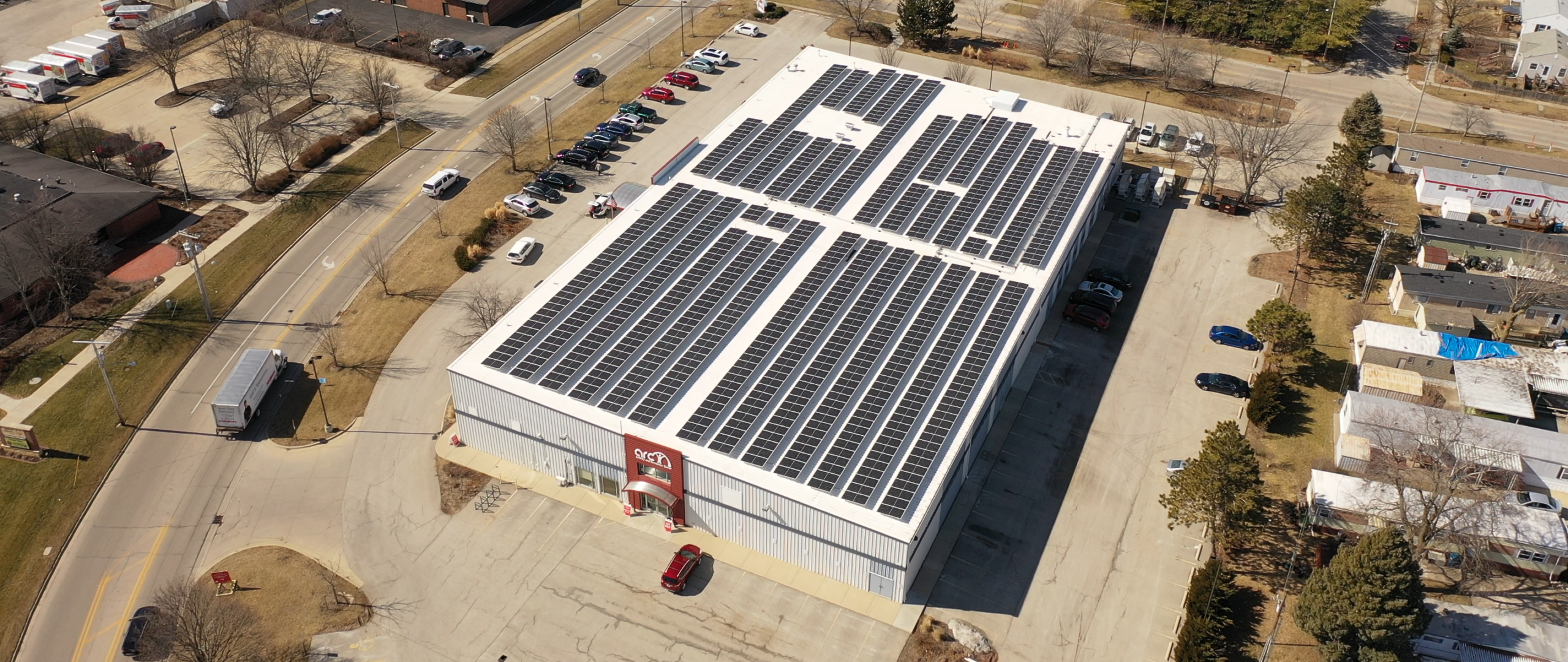HOW IT WORKS
Organizations determine if their property is eligible for on-site solar installations.
The program helps organizations find qualified and vetted solar companies called Approved Vendors.
Approved Vendors and organizations work together to plan and install solar panels on their property.
Organizations are guaranteed savings on their energy bills.
What Types of Organizations Can Participate in Illinois Solar for All: Non-Profit and Public Facilities?
Organizations must meet all of the below criteria to be eligible for Illinois Solar for All:
- Occupy a property within an ILSFA environmental justice or income-eligible community.
- Be a critical service provider—a non-profit or public entity that offers critical services (including hospitals, houses of worship, senior centers, food pantries, and libraries).
- Be a public facility that hosts a department or agency that is a critical service provider.
- Demonstrate community engagement.
Benefits of Bringing Solar to Your Organization
Savings
- No or low upfront costs
- Affordable solar installations
- Guaranteed savings on your electric bill
- Increases your control over your organization’s utility bills
Community Impact
- Reduce the impact of climate change in your community
- Helps Illinois reach its renewable energy goals
Community Solar for Organizations
A single non-profit or public facility can participate in Community Solar by serving as an “anchor subscriber” and receive guaranteed savings. Anchor subscribers have a more significant portion of the solar project, but not more than 40%. They may also host the community solar project on their property, but this is not required. Organizations interested in becoming Community Solar anchor subscribers must work with an Approved Vendor during project development.
Frequently Asked Questions – Non-Profit and Public Facilities
The graphic below is an example of how ILSFA can help lower an organization’s electricity bill annually.
Monthly Energy Value
Average retail rate: 10 cents per kWh
Monthly production from solar project: 1,000 kWh
Energy value: 10 cents x 1,000 kWh = $100 in reduced electricity charges each month (from both avoided usage and bill credits)
Yearly Energy Value
Average retail rate: 10 cents per kWh
Monthly production from solar project: 12,000 kWh
Energy value: 10 cents x 12,000 kWh = $1,200 in reduced electricity costs
These savings assumptions are intended to provide a high-level example based on average retail electricity rates. Individual savings will vary. If your monthly credits are greater than your total electricity supply bill, those credits may roll over to the next month.
ILSFA guarantees all qualified participants see savings on their energy bills. Your fees cannot be more than half of the value you see from the energy produced from the on-site solar project. In this example, the total costs and fees for your solar project can be at most half ($600) of your yearly savings ($1,200), so you would not pay more than $600 in costs.
Your organization’s savings depends on the following:
- Average Electricity Rate: The higher the electricity rate your organization currently pays, the more money you can potentially save. You can check your utility bill to see your current rate.
- Your Site’s Suitability For Solar: The direction the roof faces, its angle, and how much shade it gets will affect how much electricity a roof-mounted solar project will generate. For ground-mounted systems, the area or land where the system would be installed should have no obstructions, flooding, or contamination.
- Optimizing Your Energy Usage: Sharing your electricity usage history with an Approved Vendor will help them optimize your system. They will design a project that fits your building’s historical electricity use.
- Tax Credits: Non-profit organizations and public facilities cannot take advantage of tax credits. However, your Approved Vendor may be able to, and if so, they must pass some of the benefits to you by providing at least 65% savings on energy value.
- How Long You Plan To Stay At Your Location: If you lease or sign a power purchase agreement, you may be required to buy out the contract if you move.
A qualified Critical Service Provider is a non-profit or public entity that offers critical services to income-eligible or environmental justice communities. View the list of Critical Services Providers to see if your type of organization is qualified.
Here are the most common options:
System Purchase: Your organization purchases the solar system, and its energy is credited to your electricity bill.
System Lease: Your organization leases the solar system, and the energy it produces creates credits on your electricity bill.
Power Purchase Agreement: Your organization purchases the electricity from the system owner. The project is on your organization’s property but is owned by someone else.
Illinois Solar for All ensures safe and fair business practices by deploying stringent guidelines for Approved Vendors to ensure a transparent, safe, and positive experience for every participant. Approved Vendors must present standard disclosure forms before any work begins. These disclosure forms provide important information on exactly how much your organization will pay and how much your organization will save. You can even use the disclosure forms to compare offers from different Approved Vendors. The program guarantees savings and has a 14-day cancellation period without penalties.
